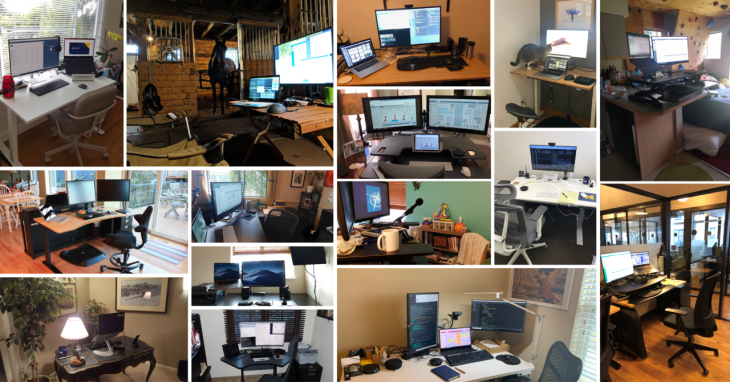Silicon Valley companies had already been going remote-first when the coronavirus became a global pandemic. This means there are lots of great software tools already on the market, that are seeing a huge amount of new usage now. And not just Zoom. Alex Wilhelm checked in with HiveIO, Friday, FreeConferenceCall, Brandlive, Kentik, Bluescape, LogMeIn, and other remote-oriented SaaS startups large and small to get the freshest data for Extra Crunch. Here’s what FreeConferenceCall reported back, for example:
- United States and United Kingdom: +6%
- India: around +10%
- France and South Korea: +20%
- Italy: +170%
- China: +524%
- Hong Kong: +1576%
- Vietnam: +3836%
Next, check out Ron Miller’s look at what experts recommend right now (EC) if you’re trying to make the transition for your team or company.
We’ll have more analysis of great remote-first companies and investment areas coming up soon, as the working world goes through this abrupt transition to an already inevitable future. In the meantime, be sure to check out our existing coverage:
How to work during a pandemic (TC)
How we scaled Seeq by being remote first (EC)
How to make remote work work (EC)
Essential tools for today’s digital nomad (EC)
Remote workers and nomads represent the next tech hub (EC)
One final note: wondering why there’s no vaccine yet? Connie Loizos caught up with long-time healthcare investor Camille Samuels for TechCrunch. “The reason you hear about cancer and orphan diseases so much is that you can price high in those areas,” the Venrock partner explains. “In therapeutic areas where you can’t price high because there are already a bunch of generics on the market — pain, depression, other huge unmet needs — you don’t see as much innovation. It’s a matter of [businesses] following the incentives. With infectious disease, you’ve got this problem that maybe someone even a year ago predicted might become a problem, but when it’s a potential and not an actual problem, it’s hard to get investors to fund something like that.”

Three cofounders is the magic team number for pre-seed investors
What are the main characteristics of successful pre-seed fundings these days? Docsend, the document management company that thousands of founders use to share decks with investors, has a new report out that surveys recent pre-seed fundings to determine what success is looking like these days. Resident former VC Danny Crichton dug into the data — based on an anonymized survey of founder-users — and highlighted some surprising trends on TechCrunch. Here’s one: companies with larger founding teams were able to raise with fewer meetings, but the companies that averaged the largest raises per number of meetings have three cofounders.
CEO and TechCrunch/Extra Crunch columnist Russ Huddleston also said that the quality bar for products appear to have gone up. “We used to say you could get funding with an MVPP (minimum viable PowerPoint),” he said, “but VCs are spending a significant amount of time looking at the product pages of successful decks, and really expect a level of product readiness that we didn’t see five years ago.”

A16z general partner Connie Chan talks the future of consumer tech (including remote-first bets)
With a recent investment in virtual conferencing startup Run the World, Connie Chan is at the forefront of consumer investing trends as we know them today. She sat down with Connie (Loizos) for a wide-ranging interview on Extra Crunch, here are a few highlights:
- On D2C: “It’s less specific almost about what the product is, but the market they’re going after, and what kind of margins you have to play with from a marketing standpoint.”
- On remote-first trends in China right now: “People are spending more time at home, so whether it’s games or streaming or whatever they’re doing at home is doing well. Lots of my counterparts in China are also taking all their pitches via video conference. They’re still doing work, but they’re all just working from home.”
- On the potential for a ‘super app’ like WeChat: “WeChat started as a communications platform, so naturally you would think communication is a great place. But the other big ingredient of a super app is the payments layer, or some kind of connection to either your credit card credentials or your bank account. So in that sense, anything else that powers transactions also has a really good shot of doing it right. Like, if I’m using DoorDash to order food, why not also use it to order X and Y and Z that also requires a credit card checkout or also requires some kind of logistical delivery. If you look at GoJek or Grab in Southeast Asia, that’s exactly what they’ve done. They started in transportation, but they also do grocery, they do food, they do loans, they do fintech. They do everything in one place.”

TechCrunch Senior Editor Alex Wilhelm
Alex is a long-time writer, editor and analyst who fully rejoined TechCrunch recently to write prolifically on topics including but definitely not limited to a daily finance column for Extra Crunch about the $100m ARR club, unicorn IPOs, business models, investing trends and other topics that are most dear to our startup audience. He is also the host of the popular Equity podcast, a real mensch, and like me, from Corvallis, Oregon. Given how popular he is with our core readers, we decided to get him talking about himself a little more in this Q&A on TechCrunch.
Across the week
TechCrunch
New AngelList data set sheds light on the signaling risks of seed-stage investments
SXSW cancels its 400K-person conference due to coronavirus
SF poised to pass Prop E, which could significantly reduce new supply of startup office space
Startup Battlefield applications for TechCrunch Disrupt SF 2020 are now open
Why you can’t overlook the small details in the pursuit of innovation
Extra Crunch
Oyo layoffs, Airbnb’s delayed IPO and the long-term quandary of investing in travel startups
Understanding 2020’s early-stage fundraising market
Break-even ads can generate free brand awareness
Inside the effort to turn startups into zebras, not unicorns
Lerer Hippeau’s Ben Lerer shares his priorities for scouring seed deals
Dear Sophie: I live in India and run a startup
Here’s what’s in the latest episode, via Alex:
- Kleiner has more money, again. About a year after raising a $600 million vehicle, Kleiner Perkins raised a new, larger fund. Now flush with $700 million, the longstanding venture group has more money to play with than it has in recent memory. For early-stage deals, that is.
- Atrium shut down after raising $75 million. Investors got some of their money back, but the company had to lay off its 100 employees. The lesson here is that famous backers and tenured founders can’t will something into existence that doesn’t work.
- OYO is laying people off. Again. The major SoftBank Vision Fund-backed Indian hotel brand was supposed to be a massive hit. Now, with novel coronavirus and other challenges, it and global tourism are hitting snags.
- We also poked at the Robinhood downtime that came during a period of sharp trading swings. The company has a lot of work to do to recover user trust, and continue to grow into its valuation. (More on that here.)
- Zoom was the day’s good news, posting strong earnings (here), possibly indicating that remote-work companies are seeing demand for their products.
And don’t miss the Equity Shot from this Tuesday, which Alex and Danny put together about activist fund Elliott Management. It has just bought a large stake in Twitter and is trying to remove founder and CEO Jack Dorsey(!).
Want Startups Weekly or any of the other great newsletters from TechCrunch in your inbox? Subscribe here.
